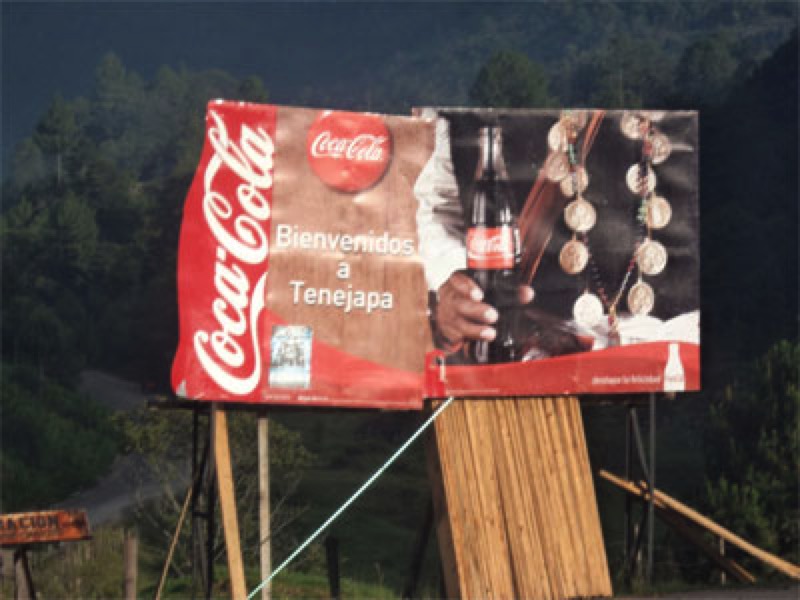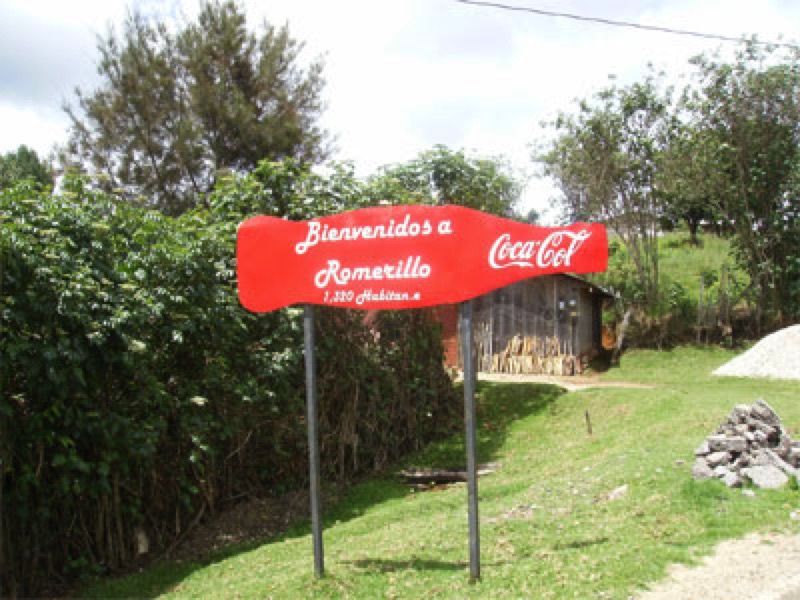Killer Coke Update | Sept. 16, 2011
Coca-Cola Suffers Major Blows
Contents of the Newsletter
- Sinn Fein National Conference Promotes Campaign & Boycott of Coke
- University of Saskatchewan Dumps Coke in August 2011
- University of California-Berkeley Dumps Coke in August 2011
- Coca-Cola Canned from Dow Jones Sustainability Index
- The Vitamin Water Deception
- SEC Complaint Filed over Coke's Failure to Disclose Risk of Legal Problems in Mexico
- Coke Doing Damage Everywhere in Mexico
- Donate to the Campaign to Stop Killer Coke
- See "The Coca-Cola Case" with Discussion Led by Tony Benn
1. Sinn Fein National Conference Promotes Campaign & Boycott of Coke
A major political party in Ireland, Sinn Fein, voted unanimously on September 9, 2011 at the 2011 Sinn Fein Ard fheis (National Conference) in Belfast to support "the Campaign to Stop Killer Coke and the campaign to boycott Coca-Cola for their corporations' failure to act in support of workers at bottling franchises in Colombia and other countries."
Sinn Fein is the second largest political party in Northern Ireland having won 178,224 votes in the Northern Ireland Assembly election in 2011. It is the third largest political party across the island of Ireland with a popular vote of 398,915, combining the Irish general election, 2011 in the Republic of Ireland and the Northern Ireland Assembly election, 2011 in Northern Ireland.
Below is a video of South Sligo delegate Sean Joyce making a statement of support for the resolution. Sean works with Sinn Fein Youth. Any student in Ireland interested in working with Sinn Fein Youth and the Campaign to Stop Killer Coke can contact South Sligo Delegate Randy Cecil at rcecil@sligotreasure.com:

South Sligo delegate Sean Joyce making a statement of support for the resolution
View the video on YouTube
The text of the resolution follows. Delegate Randy Cecil informed us that the resolution passed unanimously:
"This Ard Fheis notes the 2011 International Trade Union Confederation (ITUC) which revealed that 90 trade unionists were murdered in 2010 for their efforts in defending workers' rights. This included the assassination of 49 trade union leaders in Colombia. In addition to those killed across the globe, many more trade unionists were arrested, attacked or subjected to harassment and intimidation. This included 75 reported death threats against trade unionists, at least 2,500 arrests, and around 2,500 sackings of union members decent working rights and conditions. In Turkey alone, an estimated 350 unionists were dismissed for their union activities.
"This Ard Fheis notes the need for international solidarity to confront this activity, which is carried out by both governments and international corporations.
"This Ard Fheis re-iterates its long standing support for the Campaign to Stop Killer Coke (www.KillerCoke.org) and the campaign to boycott Coca Cola for their corporations' failure to act in support of workers at bottling franchises in Colombia and other countries."
Fifteen hundred attended the conference, 1,000 leaflets were distributed and Coca-Cola beverages were not sold or made available.
2. University of Saskatchewan Dumps Coke in August 2011
a. The loss of this exclusive contract at University of Saskatchewan in Canada was a major blow to Coke, but a great victory for the Campaign and justice.
"In addition to financial considerations, the beverage committee also looked at the environmental and ethical track records of the two companies.
" 'They were very conscious of that when they were making the decision,' said Hitchings. Coca-Cola's somewhat checkered history on these fronts has inspired the 'Killer Coke' campaign to spread the word..."
"Pepsi beats out Coke for five-year campus beverage deal" by ISHMAEL N. DARO, Editor-in-Chief, The sheaf, University of Saskatchewan, August 14, 2011
Read Article
b. As reported in our November 2007 newsletter:
"Lots of activity has been happening at the University of Saskatchewan to educate the community about Coca-Cola's crimes and misconduct and to bring an end to the monopoly stranglehold Coke has on the university. Over the past six weeks, students have been targeting specific buildings and areas of this large campus handing out flyers and hanging posters everywhere -- on bathroom doors, bulletin boards, by water fountains and on classroom lecture podiums. They are using Campaign to Stop Killer Coke flyers and posters and are creating their own focusing on various themes that are of major concerns to different audiences from health to human rights.
"Groups concerned with social justice, health and environmental issues attended a big town meeting. Television news features describing Coke's labor and human rights abuses in Colombia were shown. The consensus of the many participants was: We don't need Coke's dirty money!"
c. In January 2008, we reported:
"Students on the campuses of University of Saskatchewan & University of Regina met this month over a weekend to coordinate campaigns to kick Coke off their campuses. They are planning some big events to draw attention to Coke's many human rights abuses and other injustices. Involved in their meeting were also students from the University of Alberta, University of Calgary and University of Winnipeg."
d. In February 2010, we reported in our newsletter:
TheSheaf.com, (University of Saskatchewan) "Killer Coke is no joke: Deadly trouble in the Coke bottling plants of Colombia, By Greg Reese, February 9, 2010
Read Article
"I like Coke. It tastes good and it wakes me up when I'm tired. So, I would like to think that the accusations leveled against the soft drink company in 'The Coca-Cola Case,' a documentary funded in part by the National Film Board of Canada, are not true -- but I have a bad feeling..."
"Even before the first screening at Concordia University in Montreal, Cinema Politica was threatened with legal action from lawyers representing the soda-pop giant. So what exactly is Coca-Cola trying to stop people from viewing?"
3. University of California-Berkeley Dumps Coke in August 2011
Coca-Cola suffered another major blow with the loss of this exclusive contract. After a Campaign to Stop Killer Coke presence at U-C, Berkeley for some 8 years, the University has decided to drop Coke products, in part, because as Kurt Libby, Chair of the Beverage Alliance at U-C stated: "We did a bunch of research as we were going into the contract to see how Pepsi and Coke were both received at other campuses. Pepsi seemed to have very positive references...They [the students] were unhappy with Coke for a number of reasons and these were all things we addressed in the RFP {Request for Proposal}."
In the past year, the Campaign to Stop Killer Coke contacted some 10,000 members of the U-C Berkeley community, including faculty, administrators and student groups. We received a number of replies from faculty and students that all basically said: "We love what you're doing. We want Coke off our campus."
"Vending of new partner's drinks begins at UC Berkeley" by By Anny Dow & J.D. Morris,The Daily Californian, August 10, 2011
Read Article
Below is a July 10, 2011 article and comment in response to the debate about whether to have Coke or Pepsi on campus:
"Coca-Cola and Pepsi compete for campus beverage contract" by Noor Al-Samarrai, The Daily Californian, July 10, 2011
Read Article
Comment to the article by "Furiousjack":
How can UC-Berkeley even consider offering Coca-Cola another contract? Doesn't the university believe in justice? Doesn't this University have a conscience? Coca-Cola is involved in the most deplorable labor, human rights and environmental crimes, perpetrated on a worldwide scale. These abuses are well documented in two recent books; The Coke Machine: The Dirty Truth behind The World's Favorite Soft Drink by Michael Blanding (Penguin Group, Sept. 2010) and Belching Out The Devil: Global Adventures With Coca-Cola (Mark Thomas, Nation Books, 2008). Coca-Cola's abuses are also detailed in two feature-length documentaries; The Coca-Cola Case (National Film Board of Canada, 2010,www.thecoca-colacase.org ... and Dispatches: Mark Thomas on Coca-Cola, which aired during primetime on national television in the UK in 2007. The most impressive accounting of Coke's crimes worldwide can be found @ www.killercoke.org.
If the information contained in the books, documentaries and killercoke.org are untrue, than why doesn't the company sue the authors, publishers, filmmakers and producers? UC-Berkeley should tell Coke to take a hike and that they are not welcome on campus!
The Daily Californian, "Students Criticize Campus's Coca-Cola Contract," By Noor Al-Samarrai, September 27, 2010
Read Article
"A 10-year contract giving Coca-Cola Co. exclusive rights to sell beverages on the UC Berkeley campus is coming under fire within the student community. Students with the Coalition For a Better Contract joined forces with ASUC senators to author a bill condemning Coca-Cola's business practices and urging the campus to reconsider the terms of its contract. The student bill is scheduled to be reviewed tonight by the ASUC Senate Committee on University and External Affairs and may move to the senate floor on Wednesday, said Cooperative Movement Senator Elliot Goldstein, an author of the bill"
4. Coca-Cola Canned from Dow Jones Sustainability Index
"HP, Coca-Cola and FedEx knocked off Dow sustainability indexes," By Heather Clancy, SmartPlanet.com, September 9, 2011
Read Article
In a strong rebuke to Coca-Cola, the Dow Jones Sustainability Index (DJSI) removed the company from its Index.
On its Web site, Dow Jones defines corporate sustainability as "a business approach that creates long-term shareholder value by embracing opportunities and managing risks deriving from economic, environmental and social developments." Clearly The Coca-Cola Company has come up short, as it was one of the largest companies to be kicked off the list.
Dow Jones should be applauded for this move. It has sent a strong message to all Coca- Cola shareowners and consumers that the company has come up short when it comes to long-term sustainability. The Index has also sent a strong message to The Coca-Cola Company to get its house in order.
According to Wikipedia "The DJSI is based on an analysis of corporate economic, environmental and social performance, assessing issues such as corporate governance, risk management, branding, climate change mitigation, supply chain standards and labor practices. The trend is to reject companies that do not operate in a sustainable and ethical manner..."
In 2006 it was reported that The Coca-Cola Co. was dropped from the Broad Market Social Index (BMSI) list of "socially responsible" companies. The BMSI list is prepared by KLD Research & Analytics, an investment research firm that is considered a world leader in defining corporate responsibility standards. The Atlanta Journal-Constitution reported that "KLD based its decision on a number of issues - labor and human rights in Colombia, environmental issues in India..." and aggressive marketing of unhealthy soft drinks to children. Since 2006, Coca-Cola has not been returned to the BMSI.
5. The Vitamin Water Deception

"...In the courtroom, Coca-Cola's lawyers made this astonishing statement!"
View the video on on YouTube
Created by the non-profit Consumer Wellness Center (www.ConsumerWellness.org) and narrated by Mike Adams (www.NaturalNews.com), this latest episode of the popular "Food Investigations" series exposes what's really in Vitamin Water. It turns out the beverage is more "sugar water" than vitamin water, and even Coca-Cola's own attorneys now publicly admit Vitamin Water is NOT a healthy beverage.
6. SEC Complaint Filed over Coke's Failure to Disclose Risk of Legal Problems in Mexico
Despite Lawsuits and a Government Investigation in Mexico that Could Cost Shareholders Billions of Dollars, Coke Refuses to Address Potential Liabilities
Ray Rogers, Director of Corporate Campaign, Inc. (CCI) and the Campaign to Stop Killer Coke filed a complaint on June 6, 2011, with the U.S. Securities and Exchange Commission (SEC), urging the regulatory agency to investigate violations of U.S. securities law committed by The Coca-Cola Company and its Chief Executive and Chairman Muhtar Kent.
CCI's complaint to the SEC involves Coca-Cola's and Mr. Kent's public denial of the existence of an ongoing series of lawsuits and government investigation regarding the company's operations in Mexico that could potentially cost Coca-Cola and its shareholders billions of dollars.
See Press Release and Complaint
7. Coke Doing Damage Everywhere in Mexico
Xaviera Cabada, Health Promoter in Mexico, wrote us and sent these photos illustrating Coke's undermining of the health of citizens everywhere in Mexico:

Coke ad on a Welcome sign to Tenejapa using a "spiritual authority" to sell Coke.
"Coca-Cola has managed to filter itself in the most sacred cultural spaces of Mexico. For example, in those faraway communities in Chiapas, the publicity they use is terrible -- like a spiritual authority wearing complete religious suit and holding a Coke. The suit is more than just clothes; the suit in Chiapas is honor; is responsibility; is identity. And here, they are using it for mere commerce purposes. Taking advantage of the poverty and the ignorance of what everything Coca-Cola really is -- they manage to filter themselves into spaces they do not belong with marketing manipulations. Coke doesn't care if they are harming the population and their health with the excess of sugar intake from the beverages.
"Amazingly, inside the communities of Chiapas, the regular soda will cost half the price it will cost in the cities. But why is that so if it takes them a lot more trouble and money to transport them all the way over there? A single container of 600ml/20oz, (the most popular one) of Coke contains 12 teaspoons of sugar. The population has no idea of the amount of sugar they are drinking and the harm this is doing. According to the World Health Organization, an adult should not ingest more than 6 to 10 teaspoons of sugar at most through the whole day. According to the American Heart Association, the limit for an adult is between 5-7 teaspoons a day, and for a child over three years old is between 3 to 4. With only one soda, they have doubled the amount of sugar.
"According to nurses' testimonies, the amount of diabetes among the rural population is increasing incredibly. But not only that: the amputations are extending not only just to feet like it happens with the "diabetic feet", but also the hands. Because these are country men and women who work with their hands to pick the harvest, the consequences of diabetes are much worse if you add the fact that they don't have access to health service like in the cities. Guerrero is another example of what happens inside the communities. The amount of soda the kids and adults drink is very high; it can go up to more than a liter a day. This means, more than 26 teaspoons of sugar a day. By the area of the Mountain, five trucks loaded with tons of Cokes go into the communities daily to be distributed among the stores and the population. Chiapas and Guerrero are the states that consume more Coke in the whole country. Is it coincidence? No. It's marketing. Sometimes people have no option but to buy soda, because there is no water. They don't know it's addictive; they don't know it harms them; they simply don't know... they are just thirsty and ignorant of the side effects.
"Coke is everywhere: TV, schools, billboards, even the towns' road signs. For the people it is hard to see the harm."

Coca-Cola ads everywhere in Mexico, even on Welcome signs in cities and towns.
Dr. Ann Lopez, author and environmental science teacher at San Jose City College in California, concurs:
" 'The people of west central Mexico are easy corporate prey for predator Coke. You can't stand anywhere in some of the rural towns and not see a Coke ad. I've seen what Coke is doing in the west central Mexico countryside where I do research: pushing their addictive products on peasant populations who can ill afford them and in which one in 10 may have undiagnosed diabetes.'
"She points out that struggling people, unaware of the ill effects of the soft drinks, will 'sell the healthy things that they grow on the land, like corn, beans and eggs from chickens to buy cola which they eventually become addicted to.' She quotes Vicente Silva, a former municipal president of Chilchota saying that 'Coke and beer arrive at the Purepecha indigenous towns and villages, in the morning, before the arrival of milk!' "
And so does Beverly Bell:
"Under former Mexican President Vicente Fox, who was president of Coca-Cola in Mexico prior to his election, Coke negotiated 27 water concessions from the government, 'threatening the country's water supply and undercutting indigenous control of natural resources,' according to Beverly Bell (In These Times, 10/6/06). She added: 'Each Mexican consumes an average of 483 eight-ounce glasses of Coke per year in a country where more than 12 million citizens do not have access to potable water.' "
Mexico remains Coca-Cola's second largest market. The country has the highest per capita consumption of Coca-Cola in the world.
8. Donate to the Campaign to Stop Killer Coke
Please strike a blow against Coca-Cola's abuses and help the Campaign with a contribution.
To contribute by credit card via Pay Pal, go to Killer Coke Contribute
To contribute by check or money order, please make check or money order payable to "Campaign to Stop Killer Coke" and mail to:
Campaign to Stop Killer Coke
PO Box 1002, Cooper Station
New York, NY 10276-1002
9. See "The Coca-Cola Case" with Discussion Led by Tony Benn
London Socialist Film Co-op at the Renoir Cinema, Brunswick Square, London WCI
- 11 am, Sunday, December 11, 2011
- Discussion led by Tony Benn
- Phone: 020-7278 5764
- Download the flyer in .PDF
- See "Upcoming Events"











